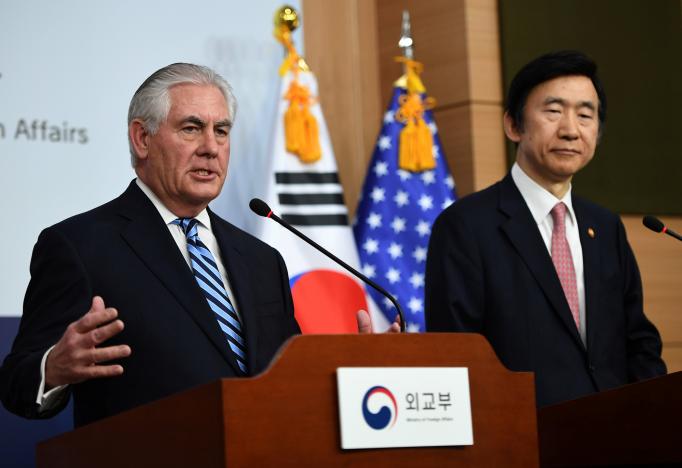US Secretary of State Rex Tillerson announced on Friday that Washington’s policy of strategic patience with North Korea “has ended”, saying a new range of security and diplomatic measures are being explored.
He said while on a visit to South Korea that military action would be “on the table” if Pyeongyang elevated the threat level.
Tillerson began his first Asian visit as secretary of state in Japan on Wednesday and will travel to China on Saturday with a main focus on finding a “new approach” on North Korea after what he described as two decades of failed efforts to denuclearize the insular nation.
He said during a press conference with his South Korean counterpart Yun Byung-Se in Seoul that any North Korean actions that threatened the South would be met with “an appropriate response”.
“If they elevate the threat of their weapons program to a level that we believe requires action, that option is on the table,” Tillerson said when asked about military action.
Tillerson also called on China to implement sanctions against North Korea and said there was no need for China to punish South Korea for deploying an advanced US anti-missile system aimed at defending against North Korea.
China says the Terminal High Altitude Area Defense (THAAD) system’s powerful radar is a threat to its security.
“We believe these actions are unnecessary and troubling,” Tillerson said, referring to what South Korea sees as Chinese retaliation in the form of business restrictions in response to the deployment of the missile system.
Washington and Seoul say it is for purely defensive purposes, but Beijing fears it could undermine its own nuclear deterrent.
North Korea has a long-standing ambition to become a nuclear power, saying it needs to be able to defend itself, and conducted its first underground atomic test in 2006, in the teeth of global opposition. Four more test blasts have followed, two of them last year.
The United Nations has imposed multiple sets of sanctions on the North over its nuclear and missile programs, but its main diplomatic protector and trade partner China is accused of not fully enforcing them.
Beijing shares US concerns over Pyongyang’s attempts to build an arsenal of nuclear devices, but has also blamed Washington for escalating tensions.
Tillerson’s Asian tour comes after a missile launch last week that Pyongyang described as a drill for an attack on US bases in Japan.
The US has 28,000 troops stationed in South Korea to defend it from the North, but the capital Seoul is within range of Pyongyang’s artillery and analysts believe any conflict could risk rapid escalation and heavy casualties.
Later on Friday, Russia urged an end to a “vicious circle” on North Korea, claiming tough US reactions to nuclear tests by Pyongyang escalate tensions on the peninsula.
“We suggest looking at the situation in a multi-dimensional way in order to break the vicious circle of tensions,” Russian deputy foreign minister Igor Morgulov told Japan’s JiJi Press in an interview posted on the ministry’s site Friday.
He said that currently “in response to North Korean nuclear missile ‘experiments’, the United States and its allies take steps to bolster exercises and other military activity, which in turn pushes Pyongyang to new provocative actions.”
Russia, which shares a land border with its Soviet-era ally North Korea, wants to ensure “the resolution of the problems of the Korean peninsula through peaceful political and diplomatic means,” Morgulov stressed.
Morgulov will take part in talks in Tokyo on Saturday ahead of a meeting between Russian Foreign Minister Sergei Lavrov and Defense Minister Sergei Shoigu and their Japanese counterparts in Tokyo on April 15.
